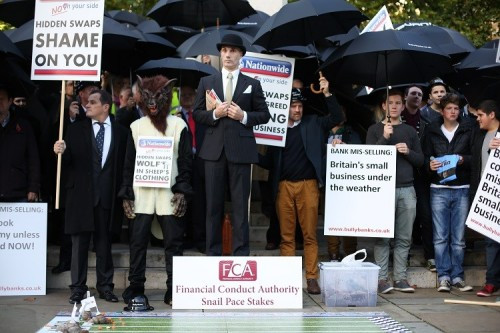Mis-selling Derivatives Scandal: End is Nigh but Problems Remain High

The mis-selling derivatives scandal should come to an end this year.
Britain's biggest banks are set to finish the review process, while the statute of limitations act means that remaining customers will be barred from making any claims through the courts.
Even though the Financial Conduct Authority's (FCA) interest rate hedging product reviews scheme is forecasted to be completed in May this year, customers' legal rights diminish with every month that passes. And here is still a raft of problems that can cause a fracture in banks' balance sheets as well as the survival of thousands of UK small to medium enterprises.
Notably, one of the biggest issues to smack victims in the face is the fact that relatively little has been set aside, let alone paid out, to victims of mis-sold interest rate swap agreements (IRSA).
IRSAs are contracts between banks and customers where typically one side pays a floating or variable rate of interest and receives a fixed rate of interest payments in exchange.
Such contracts are used to hedge against extreme movements in market interest rates over a given period. Companies that saw the value of these products move against them as rates fell during the recession now owe banks inordinate sums of money in yearly interest payments.
The biggest sellers of these products are Barclays, HSBC, the Royal Bank of Scotland (RBS), and Lloyds Banking Group.
Double the Payouts but Tiny Total
Figures for January show that £306.2m (€368.4m, $499m) has been paid out so far, compared with £158.6m the previous month [Figure 1] - a drop in the ocean compared with the £20bn set aside to cover the payment protection insurance scandal.
"Coverage of the FCA swaps review progress will no doubt focus on a doubling in total payouts to £306m," said Scott Cowan, Director at Veritas Treasury.
"But behind the headline figures there remains considerable misery and anxiety for SMEs still waging a protracted and stressful battle against their banks - or worse - excluded from the entire process on a technicality and with no hope of redress.
"More money delivered into the bank accounts of SMEs who have been mis-sold swaps is of course a good thing but there is no room for complacency or self-congratulation on the part of the banks."
Indeed, the total amount set aside from Britain's biggest banks for the mis-selling derivatives scandal only amounts to just over £3bn. Even more worryingly, a large portion of this amount has gone on administrative charges rather than on compensation.
Redress: Quality versus Quantity
Only 2,092 victims have accepted "full tear up" and alternative product offers so far, which means that there are thousands that are either being not offered compensation or haven't opted into the scheme.
Experts also say that offers are often inconsistent and are not necessarily straight cash refunds for the IRSA payments made in the past.
"We are seeing many redress offers come through," said Martin Berkeley, a FCA-authorised consultant at Vedanta Hedging.
"[However] the banks' timings are very inconsistent. For example, the quickest has been a week, while other cases take months. Some are getting full tear up, many replacement products."

He added: "the replacements are quite expensively priced and are often not particularly suitable or perhaps what a client would have chosen. It also seems bizarre that the banks are still insisting that customers don't need to take advice - when they are being presented with a contract and another derivative!"
"We are also seeing quite a few customers who are deemed sophisticated and hence fall outside the redress scheme. Some are large concerns, but many are borderline. It does seem perverse that those classified as retail clients are suddenly deemed sophisticated for the purposes of the review, based on their assets, turnover or number of staff. "
Ticking Time Bomb
The issue of time is extremely pertinent for alleged mis-sold IRSA victims as it could mean the difference between staying solvent and also what type of legal options are available to those who want to make a claim.
Many people who 'purchased' IRSAs took place in pre-2008 credit crisis and since the statute of limitations means a person can only has six years to file a legal claim from the date that the contract was executed, it means that a remainder of businesses will find that their legal rights have already diminished – if not already.
Meanwhile, lobby groups, such as Bully-Banks, and politicians have continually identified between 30,000 to 40,000 people which have been potentially mis-sold IRSAs.
However, with those being processed through the FCA reviews scheme and the "3,100 customers yet to opt-in to the review," as the regulator said in a recent statement, there is still a multi-thousand person shortfall.
Previous studies by Bully-Banks have shown that the mis-selling scandal has already cost the economy £1.7bn in lost revenues to the Treasury, as well as, 400,000 jobs. If thousands of SMEs lose their solvency through lack of redress, speed of payment, or through diminished legal rights – these numbers could rise further.
Consequential Losses
Meanwhile, the issue over consequential losses has not been rectified, nor have the banks set aside any sizeable amount to cover potential costs to their balance sheets.
"The latest FCA update on the progress of the review of interest rate hedging products sales makes interesting reading, but what the figures do not really cover is what is fast becoming the single biggest concern for the banks involved - the issue of consequential loss," said Daniel Hall, managing director of All Square.
"In recent days both Royal Bank of Scotland and Lloyds Bank have increased provisions for swap mis-selling. The recent increases in provision may indicate that the long-feared prospect of consequential loss claims is finally emerging as payments relating to direct losses are settled."

Consequential loss claims, which involve the party providing evidence that it incurred losses as a result of the IRSA, are filed separately to the FCA review scheme.
This means that while a bank can make an initial redress offer - a product tear-up or switch and/or compensation - if a company is claiming for consequential losses on top of this, then it would have to wait until after the banks have assessed the application for damages.
However, banks have either put aside a very small amount or, in some cases, nothing to pay for consequential losses which would lead to very severe hits on balance sheets should the experts been proven correctly.
"Our estimate of the final bill for consequential losses is double that of direct losses," said Hall.
"We expect increased awareness of this to have a major impact on the future progress of the review, and the subsequent end bill for the banks involved. Businesses within the review should be making sure they are aware of the ability to claim for consequential loss and fully understand how to do this."
© Copyright IBTimes 2025. All rights reserved.






















